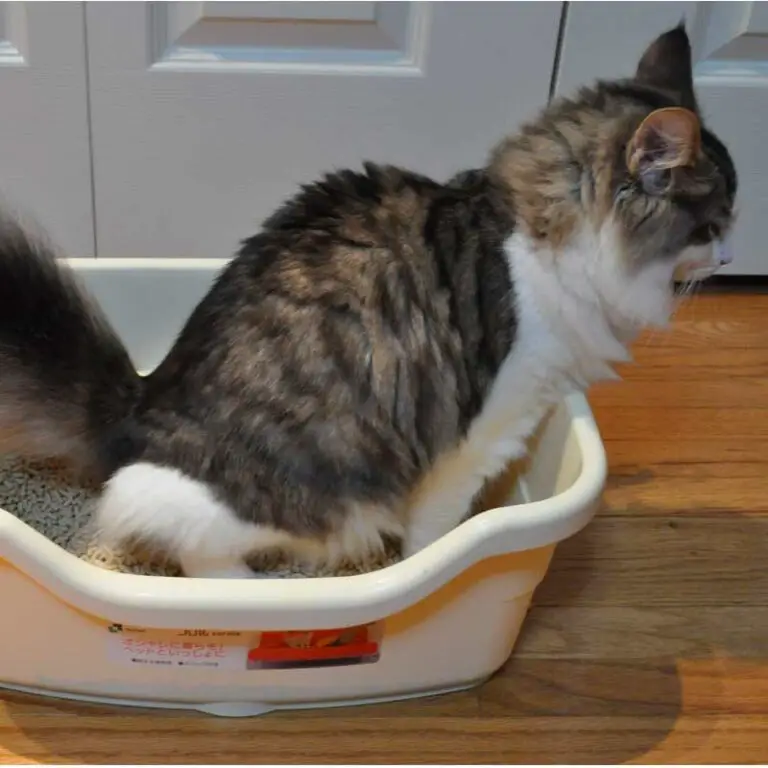Are you a cat owner who’s curious about the question do cats have parasites in their poop? If so, you’re in luck – we’ve got all the information you need right here.
Keep reading to learn more about common parasites that affect cats, and how to treat them. You’ll also find out what steps you can take to help prevent your cat from getting sick in the first place. Thanks for reading!
Do cats have parasites in their poop?
Yes, cats have parasites in their poop. Only a tiny percentage of cats shed parasites (approximately 1%). However, many parasites are capable of infecting humans. For example, certain types of intestinal parasites can cause toxoplasmosis in people with compromised immune systems (such as those with HIV).
Cats often catch parasites by ingesting contaminated food or water. Once inside the cat’s body, microbes typically reproduce within the digestive tract until they reach a number that will cause symptoms.
Sometimes, parasites reproduce in the intestine and then migrate to other areas of the body (such as the heart, lungs, brain, or eyes).
In cats, Toxoplasma gondii can be shed in their feces, and if a pregnant woman consumes or inhales the parasite unintentionally and becomes infected, she runs the danger of giving birth to an abnormally shaped child.

How do cats get parasites?
Cats can contract parasites when they eat or drink something infected with parasite eggs; for example, when a cat eats an animal that is already carrying a parasite.
The parasite eggs are usually attached to the animal’s fur or in its stomach, which means that they can easily be transmitted to a cat’s mouth when they clean themselves.
Cats are also vulnerable to parasitic infections if they eat rodents, birds, or other small animals that may already be carrying parasites.
What types of parasites affect cats?
Here are some of the most common parasites that affect cats:
- Roundworms are one of the most common types of intestinal parasites in both dogs and cats. Cats can also become infected by roundworm eggs, which can be transmitted to humans through handling contaminated cat feces. If a person inhales roundworm eggs while cleaning up their pet’s waste, the eggs can cause an infection known as roundworm pneumonia.
- Tapeworms are another common type of parasite that can affect both cats and humans. Canine tapeworms are transmitted through an infected animal’s feces being ingested, while feline tapeworms are generally transmitted through fleas (which we’ll discuss more below). People can get tapeworms if they accidentally ingest fleas while handling their pet’s waste.
- Roundworms, hookworms, and whipworms are collectively known as parasite infections that affect the intestinal tract (also known as enteritis). Symptoms of these types of parasitic infection include vomiting, diarrhea, loss of appetite, dehydration, weight loss, and lethargy.
- Cats can contract bacteria-based diseases such as leptospirosis or tick fever when they come in contact with infected rodents, other animals, or objects that have been exposed to the urine of an infected animal (such as a puddle in a park where deer might have urinated). Many of these types of infections can also affect humans, causing symptoms like fever, headache, chills, nausea, and vomiting.
How do cats get rid of parasites?
Many parasite infections can be treated with medication; however, most require specific treatment for each type of infection.
For example, tapeworms are typically treated by giving cats an oral dewormer (such as Fasigyn) once a week for three to five weeks, while roundworm infections are usually treated with medication that is administered orally every three months.
If your cat seems ill, has lost its appetite, or is experiencing weight loss or diarrhea, make an appointment with your vet right away. It’s important to get the proper treatment for any parasite infection to avoid further health complications.
How do you get rid of parasites in cats naturally?
Natural ingredients can be used to create a homemade de-worming treatment for your cat. Some of the most common natural ingredients to use include:
- Papaya seeds. Boil 1/4 cup of papaya seeds in one liter of water, and allow the mixture to cool before administering it orally once a day for 4 consecutive days.
- Black walnut hull powder. Add one teaspoon of black walnut hull powder to one cup of fresh milk, and give it orally once per day for 3 days.
- Pumpkin seeds. Add one teaspoon of pumpkin seeds to your cat’s meal once daily for 4 consecutive days.
What can I do to prevent cats from getting parasites?
This is a toughie because it’s hard to totally protect your cat from being exposed to parasites, especially if you take them outdoors. However, there are some things you can do to minimize the risks:
- Feed your cat food that has been cooked (since many parasites and bacteria can be killed by cooking) and avoid attracting wildlife to your yard (for example, by taking down bird feeders or keeping garbage cans tightly covered).
- Also, it’s a good idea to keep your cat indoors as much as possible because they’re less likely to come into contact with other infected animals that might carry parasites (although it’s important to take them outdoors for exercise and socialization).
- Cats should also be dewormed regularly because parasite infections can occur quickly once your pet is infected. Your vet can prescribe a medication that either treats or prevents an infection, depending on the type of parasite involved.

Do indoor cats have parasites in their poop?
No. Cats that are strictly indoor and have good health will not have any parasites in their poop. Outdoor cats, on the other hand, likely could have parasites in their feces which can be harmful to humans and especially children who go outside and play in a yard where cat feces might be.
What do parasites in cat poop look like?
It depends on the type of parasite. Roundworms, for example, appear as white and circular (about an inch or two in length) and spaghetti-like.
Tapeworms can resemble pieces of rice and are about a foot long. Whipworms have a similar appearance to roundworms but have one end that is curved into a “whip-like” shape.
How do you tell if your cat has worms or parasites?
There are a number of ways to tell if your cat has parasites, such as:
- Loss of appetite and weight loss. If your cat appears to be losing its appetite or is experiencing significant weight loss, it’s likely because he or she has an infection somewhere in their intestinal tract (which can also cause them to vomit and/or have diarrhea).
- Lethargy. If your cat is staying in one place for a long time or not moving around very much, it’s possible that they are experiencing intestinal issues. Vomiting.
- Cats will often vomit when they have an intestinal infection because their bodies are trying to get rid of the harmful parasites.
- Runny nose or discharge from eyes. If your cat is producing excessive mucus (from its eyes or nose) it might be because of parasites.
Frequent urination, drinking more water than normal, and/or increased thirstiness.
How long do parasites live in cat poop?
Some parasites will perish within a few days to weeks after being passed. Others can survive for longer periods of time, sometimes months. They depend on the type of parasite and the environment where it is living.
Can you get worms from kissing your cat?
No. The worms that can be passed from a cat to a human are roundworms and hookworms, both of which live in the animal’s intestinal tract. Generally speaking, kissing your cat isn’t going to result in infection.
However, if you’re experiencing frequent kisses or are sharing food with your pet, you might want to take extra precautions to make sure worms aren’t being transferred from mouth to mouth (or dish-to-mouth).
Final words
Although the presence of parasites in a cat’s stool is not a cause for alarm, it is still important to be proactive about deworming and bathing your cat on a regular basis.
By doing so, you can help ensure that your beloved feline friend stays healthy and parasite-free. Have you ever checked your cat’s poop for signs of parasites? If not, now might be a good time to start!
We covered all your doubts such as Do cats have parasites in their poop and how do they look like. You might want to check our other topics that can help you understand your cat better.
Related Articles:




